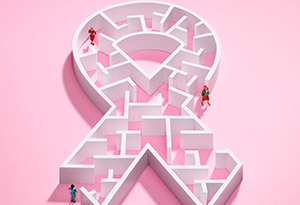The 4 Stages of Breast Cancer Recovery
Seven years ago, Kelly Corrigan called a truce with cancer—only to discover that, in important ways, she was still in the trenches.

Photo: Adam Voorhes
PAGE 2
Stage III: Connection
There is nothing wrong with using a tennis ball to play tennis. But you can also toss one into the dryer to fluff your comforter. Likewise, you can use toothpaste to soothe a bug bite and Coke to rub out rust. It's similar with cancer: Whereas initially I had applied my experience in the obvious way—to connect to fellow breast cancer patients—I soon started swapping stories with all kinds of cancer survivors, then with friends with other diseases (Crohn's, depression, shingles), then with people whose ailments weren't even physical. A bout of breast cancer, it turns out, has uses as varied as a Q-tip—because the broad-stroke pattern of crisis is so consistent. There is shock, followed by resolve, then digging for answers, then work—so much work—until, eventually, acclimation, both physical and emotional.
Within that pattern, naturally, there are switchbacks and stalls, like the desire to dissociate from the community you've been thrust into. I almost threw up the first time I set foot inside the University of California, San Francisco's Comprehensive Care Center and joined the stream of thin, slow-moving, low-voiced, gray-skinned people. I didn't want to be one of the pitied, the struck-down. But remembering that resistance came in handy when talking with my friend Joan, who didn't want to be one of the housewives whose high-flying husbands cheated, or my friend Bill, who didn't want to be one of the financial services guys who got laid off, or my neighbor Tara, who didn't want to be one of the parents who put their kid on Ritalin. I understood completely. (There's a reason people trust people who have been tested. We know things.) Cancer is a growth hormone for empathy, and empathy makes us useful to each other in ways we were not, could not have been, before.
Stage IV: Wide-Angle Amazement
It's one thing to long for life in the operating room or infusion chair. It's another to feel, in the middle of our nothing-special, could-be-better, hanging-in-there existence, how deeply we ache to be here. In the final stage of recovery, we have a shot at achieving the most elusive and divine of emotional states: awe. This is where we privately, humbly approach the well-known facts of existence—we are tiny, we have laughably little control, it will end—and sit with the staggering truth beyond: Small and fleeting, yes, but we are here. We are here.
Kelly Corrigan is the author of The Middle Place and Lift (Voice); her new memoir, Glitter and Glue (Ballantine), is due out in February.
Next: 3 breast cancer support networks



